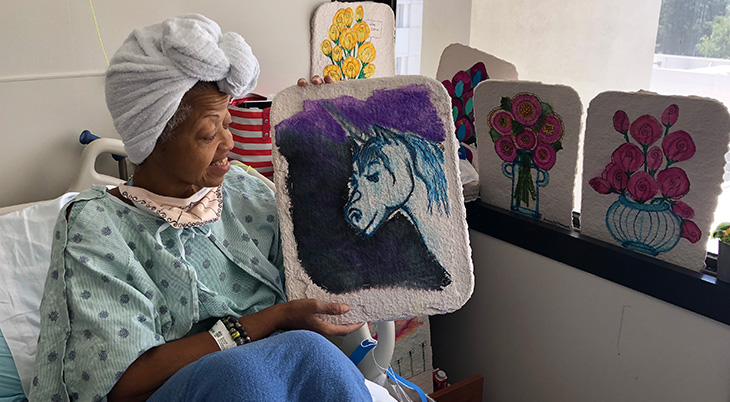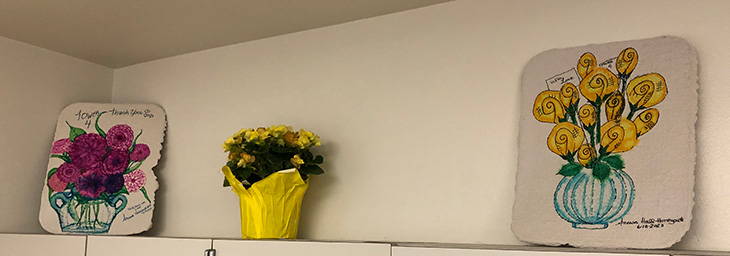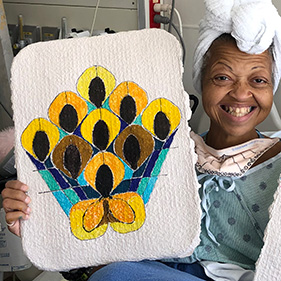"Art can permeate the very deepest part of us, where no words exist." – Eileen Miller, author and parent advocate
Anessa Hall remembers hastily dialing 911 – she felt nauseous and light-headed, she could barely breathe and it felt like a brick was laying on her chest.
"I was convinced that I was having a heart attack," she recalled.
Paramedics arrived and transported Hall to UC Davis Medical Center, where she was assessed in the Emergency Department. After conducting multiple tests, the team found she was not suffering from a heart attack but was having a mental health crisis.
"I was in a very dark place," Hall said. "But the compassion, sensitivity and kindness I received from the nurses that night is not something I have experienced a lot in life."
Additionally, Hall's blood panel showed some irregularities. She had a low amount of protein in her blood and high levels of lipids, or fats. The team ordered additional tests to investigate the cause.
After several consultations, Hall was diagnosed with a rare kidney disease called membranoproliferative glomerulonephritis with monoclonal IgG deposits. She was admitted to the hospital for treatment.
The compassion, sensitivity and kindness I received from the nurses that night is not something I have experienced a lot in life."-Anessa Hall
Connecting through art
Hall was brought to Tower 4 ENT/Internal Medicine, which specializes in caring for patients with complex kidney disorders.
"I remember being brought to my room in the middle of the night. I didn't know my roommate or anyone else around me," Hall said. "When you are sick and don't feel well, you feel alone, and it is easy to go down that rabbit hole."
That's when Hall recalls her nurse coming into her room to check on her.
"I was writing a poem because I make art when I can't gather the words," she recollected. "I couldn't believe it when my nurse asked if she could read me a poem she had written. It gave me hope."
Studies have shown that expression through art can help people with depression, anxiety and stress. Because of these feel-good effects, art is a powerful tool for self-care, mental health and resilience in ill patients.
"By sharing our poems, it made me feel connected to the world again," Hall said.

Giving back
Inspired by her gratitude for the care she had received, Hall began drawing and painting pictures on the paper food trays she received with her meals.
"I draw on anything and everything," Hall joked.
Her portraits included a blue unicorn for her roommate, flowers for her nurses and a Black choir to celebrate Juneteenth.
One of Hall's providers, Hiba A.M. Hamdan, health sciences assistant clinical professor of Nephrology, noted, "Anessa is really creating a positive from a negative. Although she started drawing and painting as a way to say thank you to her care providers, she has also found a healthy way to cope with her illness."

Hall expressed how grateful she was to everyone who provided her care throughout her stay.
"Everyone has been so patient and thorough in their communication with me," she said. "At other hospitals I have felt like I was being looked down on, but at UC Davis they have allowed me to participate in my care. It is the difference between feeling like a test tube and a human being."
Hall added with tears in her eyes, "This has been a beautiful experience for me. When I think of lifesaving care, I think of UC Davis."







